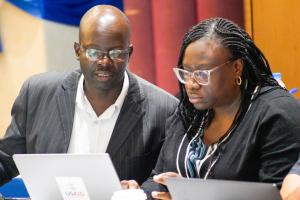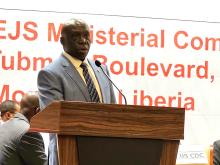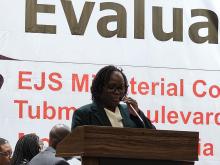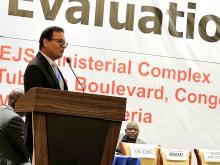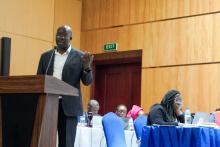Liberia Commences its Second Joint External Evaluation (JEE) for the International Health Regulations (IHR) Core Capacities
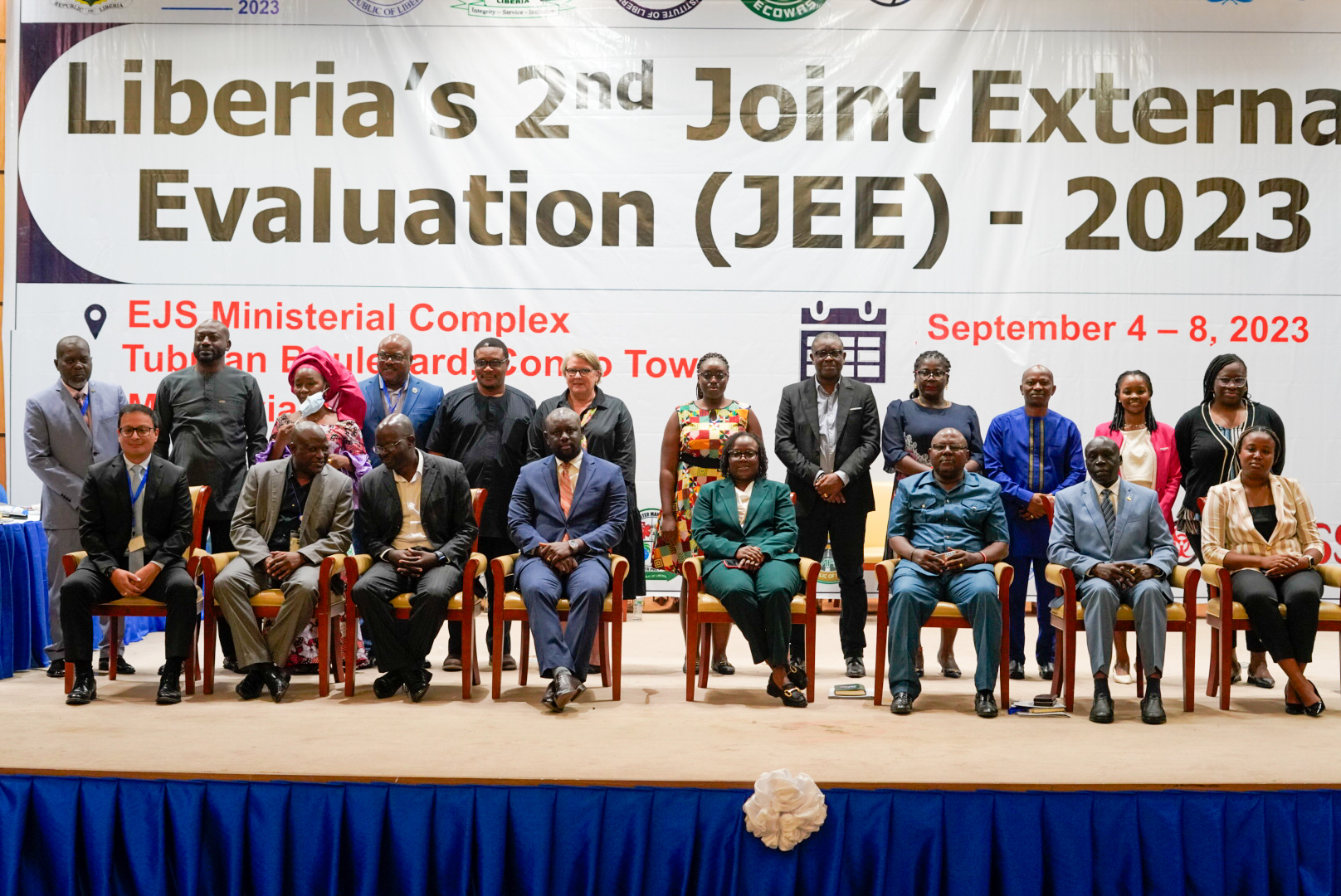 Monrovia, Liberia - September 5, 2023 - Yesterday, Liberia embarked on its second Joint External Evaluation (JEE) exercise, marking a significant step in assessing the country's capabilities to prevent, detect, and respond to public health threats in accordance with the International Health Regulations (IHR) prescribed core capacities since 2016 when the first JEE was made.
Monrovia, Liberia - September 5, 2023 - Yesterday, Liberia embarked on its second Joint External Evaluation (JEE) exercise, marking a significant step in assessing the country's capabilities to prevent, detect, and respond to public health threats in accordance with the International Health Regulations (IHR) prescribed core capacities since 2016 when the first JEE was made.
A team of 15 external evaluators mobilized by the World Health Organisation (WHO) is currently in the country to lead this comprehensive evaluation, which is scheduled to take place from 4 to 8, September 2023, at the Ministerial complex in Congo Town. Liberia stands among the few countries to undertake the second round of the JEE, utilizing the WHO JEE 3.0 tools. This initiative follows a self-assessment exercise that Liberia conducted as part of its preparatory process in July this year.
The workshop has brought together over 200 participants, including representatives from key ministries such as the Ministry of Health, Ministry of Agriculture, Ministry of Defense, Ministry of Labor, Environmental Protection Agency (EPA), National Public Health Institute of Liberia (NPHIL), National Disaster Management Agency (NDMA), County Health Officers, and experts from partner organizations, including FAO, World Bank, US-CDC, WHO, UNICEF, USAID, IRC, AFRO-HUN, GIZ, AFENET, Breakthrough Action Liberia and among others.
The JEE is a five-year periodic IHR monitoring and evaluation framework requirement, led by external evaluators, to collectively evaluate the country's preparedness and response capacities across 19 technical areas. This process encompasses a comprehensive review of presentations, documents, policies, and systems for each technical area as well as a field visit to selected areas. Following the review of these technical areas, validated scores will be aggregated to determine Liberia's 2023 JEE score. This score will signal the nation's progress in detecting, assessing, reporting, and responding to public health events.
In 2016, Liberia conducted her first JEE using the JEE 1.0 tool, which resulted in a readiness score of 46%. Subsequently, the 2018-2023 National Action Plan for Health Security (NAPHS) was developed to address identified gaps and recommendations from the 2016 evaluation. This 2023 JEE assessment will showcase Liberia's efforts and progress post-Ebola and COVID-19, demonstrating the country's commitment to strengthen its public health security.
Speaking during the official opening ceremony, the Deputy Minister of Health, Honorable Norwu G. Howard, expressed gratitude to partners, experts, and local teams for their commendable support and commitment to this exercise. Honorable Howard stated, "I thank the WHO and all our partners for helping us reach this level of preparedness, which many other countries have yet to achieve."
She emphasized the importance of keeping local communities informed about existing threats and governing public health responses.
“As I said during the last After action review for the COVID-19 pandemic, we have responded well as a country to outbreaks- thanks to our experience, but the critical gap that continues to exist is our inability to keep our society conscientised. However, when I read reports on Lassa fever and other diseases I am reminded that the people in this room are fully aware of what we need to do in the face of a pandemic or epidemic - as the multisectoral approach which includes our communities can make a significant difference in our interventions to prevent and respond to public health crises”, said Honourable Howard.
Representing the World Bank, the Liaison Officer, Ms. Georgia M. Quaye, expressed the World Bank's delight in participating in this crucial external evaluation, the second of its kind in Liberia. She emphasized that the evaluation marks a significant milestone in ongoing efforts to enhance health security in Liberia, offering an opportunity to identify progress and existing gaps. The World Bank's REDISSE project has played a pivotal role in strengthening Liberia's preparedness and response capacities, supporting various national responses to disease outbreaks, including Lassa fever and COVID-19.
The representative from USAID, the Health Security Advisor, Mr. Armando Cotrina highlighted that the exercise would be critical in engaging in in-depth discussions to identify gaps that may require innovative solutions.
The WHO Representative to Liberia, Dr. Clement Peter, acknowledged that this process is a crucial moment of reflection on improving the country's health security. WHO has been a steadfast partner in supporting the Government of Liberia throughout this process.
"This morning, we are witnessing a momentous event—a time to reflect on where we have been, where we are going, and what we need to do. In 2016, when we had just ended Ebola, the first reflection was to look at capacities that exist to implement the International Health Regulations core capacities and a good National Action Plan was developed to strengthen national capacities. Over the years we have moved. A number of processes have happened including our own internal reflections on where we are on the Health Security Agenda. This week the external evaluators will help us in identifying our strengths and also opportunities to improve health security in this country," said Dr. Peter
Furthermore, he commended that the exercise is happening at an opportune time when the ongoing global discussions on emerging infections and updates to the amendments of International Health Regulations (IHR) core capacities as opportunities to anchor these recommendations. He extended gratitude to the World Bank, USAID, US-CDC, the Global Fund, and other partners for their unwavering support. Dr. Peter emphasized WHO's commitment to supporting the nation in improving its health security, stating, "We remain committed as part of the United Nations and as WHO to support the government in strengthening its agenda on health security."
The JEE is a voluntary, collaborative, multisectoral process aimed at assessing a country's capacities to prevent, detect, and rapidly respond to public health risks, whether they occur naturally or result from deliberate or accidental events. The JEE assists countries in identifying the most critical gaps within their human and animal health systems, enabling them to prioritize opportunities for enhanced preparedness and response. The Joint External Evaluation team comprises experts from various sectors, this indicates Liberia's commitment to promoting a holistic and collaborative approach to public health preparedness.
